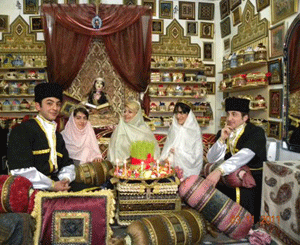Home page
» ETHNOGRAPHY
» About ethnography of Azerbaijan
About ethnography of Azerbaijan
Ethnography studies the people, the unique features of the nation, its history, archeology, as well as other scientific fields as well as sieves the results, supplements and completes it. As a result, the ethnic-national self consciousness, self recognition is created. In other words, basing on material and spiritual culture the national and moral identity is formed and the ethnography is engaged in revealing of the national-ethnic identity of the millennia. Azerbaijan, which covers a wide area of south-east of the Caucasus, is located in a favorable natural and geographical and economic-strategic space. Therefore, there were always conditions for formation of the material culture, development and expansion of existing conditions. moral cultures had formed a ground for high level of these two areas. Azerbaijan is considered to be the primary centers of human civilization. A very favorable climate of the territory of Azerbaijan, its rich flora and fauna, its antiquity, the local population, economic life, multi-faceted art, material and spiritual world had formed a ground for its comprehensiveness from the ethnographic point of view. It is also true that our people always was in close economic and cultural relations with the peoples of the Caucasus, the Middle East and the peoples of other countries since the millennia. Resulting in the mutual contact, it had got a lot of things, and benefited and enriched. Ethnography of the people of the Caucasus, in a broad sense, is an integral part of the ethnography of the peoples of the Near and Middle East. Material culture of each nation is distinguished only with its specific local features and individual characteristics. And it distinguishes an ethnicity-based culture with culture of other ethnos. In this respect, the history of material culture based on Azerbaijani people\'s centuries-old empirical experience, knowledge and skills was rich, and shows in obvious way its specificity in all spheres of national characteristics of the material culture. In particular, in the middle of the nineteenth century as a result of realization of settling of stock-breeder tribes in villages as the on the remains of community relations is protected more, so during the settling location on the kinship principles is observed strictly. As the process of settling was going among the among winter camps, the newly created villages were formed with exclusively relative patronymic groups. As a result, the formed customs and traditions had common features for all peoples. There is significant information in sources of Azerbaijani family and family life, monuments and written sources, in the works of the XIII century, the great Azerbaijani scientist, Nasreddin Tusi, in works of Azerbaijan classics, in epics, the samples of folklore literature. Interesting materials on family and family life of Azerbaijanis are reflected in the sources of XI-XVIII centuries. The family and family life issues were reflected in Russian language ethnographic literature, written beginning from XVIII century to end of XIX , early of XX century. The comparative analysis of materials clearly shows that there were no sharp differences between the family life of the Middle Ages and new period in Azerbaijan, i.e. the traditions of inheritance is observed in the family life of the Azerbaijani people. So, the people of Azerbaijan managed to preserve the customs and traditions connected with the family and family life over the centuries and improved it, developed and these traditions passed through examinations of the history and reached us. The ethnography of Azerbaijan is not just a formation that enriches the Caucasus, but generally a world ethno culture. Therefore, the Azerbaijani government pays attentions to protect the material and spiritual culture, and promoting the development. It was once more mentioned in the Resolution of Ilham Aliyev, President of the Republic of Azerbaijan, dated July 11, 2008 on creation of the Museum of Ethnography of Azerbaijan.
|
